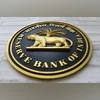By Dharamraj Dhutia
MUMBAI (Reuters) -Indian overnight index swap rates rose to their highest levels in more than five months on Thursday as investors chose to pay short-end swaps amid growing expectations of yet another rate hike from the Reserve Bank of India (RBI).
"The short-end of the OIS curve is completely factoring in one more rate hike over the next few months while talks of rate cuts have died down for now," said Vijay Sharma, senior executive vice president at PNB Gilts.
India's one-year swap rate hit 7.03% on Thursday, its highest since March 9, while the five-year swap rate jumped to 6.75%, a level last seen on Feb 27.
Swaps have jumped by over 20 basis points so far in August after the benchmark U.S. yield hit a 10-month high, and a jump in local inflation pushed back rate cut bets.
India's retail inflation in July spiked to 7.44% from 4.87% in the previous month - the highest since April 2022 - breaching the upper end of the RBI's inflation band for the first time in five months.
More From This Section
Many bond market participants are not expecting any rate action and feel yields may be around their near-term peak.
"Bond markets are unwinding premature rate cut expectations due to high inflation readings in U.S. and Indian markets. While a hike in rates is inconceivable at this time, rates are going to remain elevated and liquidity is going to get tighter," said Sandeep Bagla, CEO at Trust Mutual Fund.
Some traders expect the RBI to extend its recent liquidity absorbing measure, instead of taking any "harsh step".
Banks have been asked to maintain an incremental cash reserve ratio of 10% on increase in deposits between May 19 and July 28, and this would withdraw over one trillion rupees ($12.03 billion).
PNB Gilts' Sharma expects the central bank to extend this measure by at least for a month as next couple of inflation readings are expected to be elevated, while he expects benchmark yield's accumulating range to shift to 7.25%-7.30%. ($1 = 83.1000 Indian rupees)
(Reporting by Dharamraj Dhutia; Editing by Sohini Goswami and Nivedita Bhattacharjee)

)
